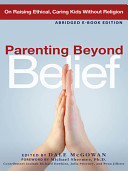Books, Brochures, and Chapters>Book Chapter: McGowan, Ph.D., Dale (2007), Seven Secular Virtues: Humility, Empathy, Courage, Honesty, Openness, Generosity, and Gratitude, Retrieved on 2012-03-28
Folksonomies: atheism humanism Memes
28 MAR 2012
 The Virtue of Humility
The Virtue of Humility
Humility, like so many of these virtues, is about caring what others think and feel, about giving validation to others instead of seeking it all for yourself. The best way for parents to teach this, of course, is to model humility ourselves. Monitor your next conversation. How often can you catch yourself saying, “I may be wrong about that”—no one should know more than a skeptic that everything includes an element of doubt—and how often do your kids hear you saying it? How often do yo...Humanists, who know we come from apes, are naturally humble.
28 MAR 2012
 The Virtue of Empathy
The Virtue of Empathy
Continually pushing out the empathy boundary is a life’s work. We can help our kids begin that critical work as early as possible not by preaching it but by embodying it. Allow your children to see poverty up close. Travel to other countries if you can, staying as long as possible until our shared humanity becomes unmistakable. Engage other cultures and races not just to value difference but to recognize sameness. It’s difficult to hate when you begin to see yourself in the other. And why...We must have an empathetic impulse, even for the impulse to believe in religion.
28 MAR 2012
 The Virtue of Courage
The Virtue of Courage
Kids need to know that nonconformity requires courage. There are plenty of nonconformists to draw upon as examples, secular and religious people alike, from Socrates to Martin Luther King to Michael Newdow—people whose strength of conviction led them to face with dignity and courage the consequences of stepping outside of the norm in the name of heartfelt principles. It isn’t easy, but doing what’s right can be well worth it.
The second reason is even more daunting. As noted above, rel...Nonconformity requires courage. So does accepting non-existence after death.
28 MAR 2012
 The Virtue of Honesty
The Virtue of Honesty
Honesty is the essence of secularism. It is a willingness to set aside any and every comfort in order to know the truth that allowed us to see our way out of religious belief. Somewhat more difficult is ensuring that we practice the same level of honesty in all other aspects of our lives. I say “somewhat more difficult” because in truth most of the humanists and atheists I know are relentlessly, exhaustively honest, sometimes to a comical extent. We are often paralyzed by our obsession wi...Not only honest to the truth, but honest with others about our non-belief.
28 MAR 2012
 The Virtue of Openness
The Virtue of Openness
Openness has several facets, but all are rooted in the same two principles: embracing your own fallibility and embracing diversity.
Secularists, being human, are as prone as anyone to cling stubbornly to our opinions once they’re established. Openness includes recognizing our own fallibility: No matter how thoroughly we have examined a question, we could still be wrong. The best way to avoid being wrong is to keep our opinions and ideas open to challenge and potential disconfirmation.
The...The best way to avoid being wrong is to be open to ideas that challenge us.
28 MAR 2012
 The Myth of Church-Goer Charity
The Myth of Church-Goer Charity
That churchgoers do the lion’s share of the charitable work in our communities is simply untrue. They get credit for it because they do a better job of tying the good works they do to their creed. But according to a 1998 study, 82 percent of volunteerism by churchgoers falls under the rubric of “church maintenance” activities—volunteerism entirely within, and for the benefit of, the church building and immediate church community. As a result of this siphoning of volunteer energy into ...Most of their charity is within their own congregation.
28 MAR 2012
 The Virtue of Gratitude
The Virtue of Gratitude
We have no difficulty reminding the 4-year-old to “say thank you” when Grandma hands her an ice cream cone, but in other situations—especially when a religious turn-of-phrase is generally used—we often pass up the chance to teach our kids to express gratitude in naturalistic terms. Instead of thanking God for the food on your table, thank those who really put it there—the farmers, the truckers, the produce workers, and Mom or Dad or Aunt Millicent. They deserve it. Maybe you’d lik...We have real people all around us to be thankful to.
Parent Reference

Books, Brochures, and Chapters>Book: McGowan , Dale (2007-04-25), Parenting Beyond Belief, Amacom Books, Retrieved on 2012-03-28Source Material [books.google.com]
Folksonomies: family relationships 



